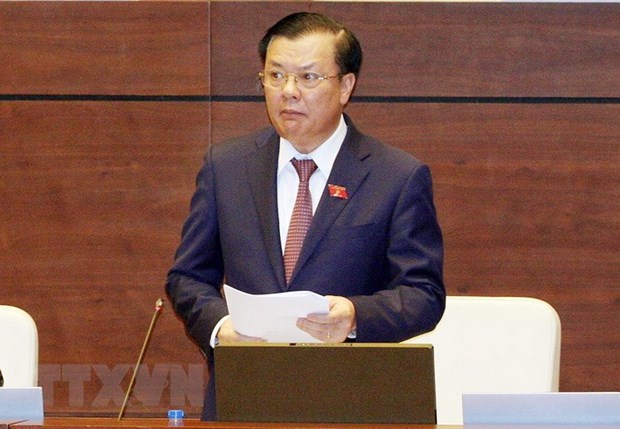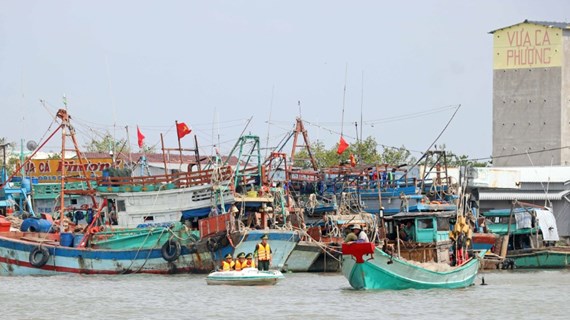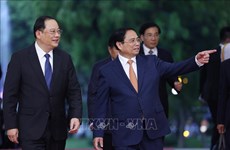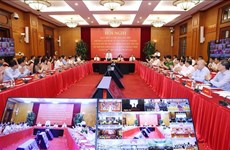Minister addresses lawmakers’ concerns over budget, financial management
Minister of Finance Dinh Tien Dung cleared up a number of questions relating to the State budget restructuring and the execution of financial disciplines, which were raised at the May 26 session during the 5th sitting of the 14th National Assembly in Hanoi.
 Minister of Finance Dinh Tien Dung (Photo: VNA)
Minister of Finance Dinh Tien Dung (Photo: VNA)Hanoi (VNA) – Minister of Finance Dinh Tien Dung cleared up a number of questions relating to the State budget restructuring and the execution of financial disciplines, which were raised at the May 26 session during the 5th sitting of the 14th National Assembly in Hanoi.
The Minister said the Government has been enacting synchronous measures to implement effectively the Politburo’s Resolution No.7 on restructuring the State budget and public debt management and the National Assembly’s Resolution No.25 on the national five-year financial plan.
As a result, the State budget collection in 2016-2017 far exceeded estimates by 9.3 percent and 6.3 percent respectively.
Budget revenues at central level accounted for 55-56 percent of the total revenues while localities contributed 44-45 percent.
In line with its integration commitments, Vietnam has forged ahead with administrative reforms and modernisation of taxation and customs.
Most of businesses at present have conducted online tax declaration, payment and refund, while all customs units have been carrying out e-customs procedures and adopting the one-stop-shop mechanism.
The Ministry of Finance has expanded the connection among customs agencies, commercial banks and State treasuries to facilitate e-tax payment, contributing to improving the national competitiveness rankings, according to Dung.
The Minister admitted that the proportion of the central budget revenue in the total State budget collection dropped from 61.3 percent in 2011-2015 to 56-57 percent in 2016-2017 due to the reduction of revenues from crude oil and trade activities.
The reduction of some taxes at a higher rate than the previous roadmap has enabled businesses to improve their competitiveness but to some extent affected the State budget collection in general and central budget revenues in particular, Dung said.
The State budget spending in 2016-2017 was strictly controlled with regular expenditures reaching about 62-63 percent. The proportion is projected to be 61.7 percent in 2018.
The finance ministry will strengthen budgetary disciplines and promote thrift practices and wastefulness prevention, Minister Dung stressed.
Relating to the execution of financial disciplines, Dung said the National Assembly has promulgated some laws stipulating responsibilities of each budget management units.
He recognised positive changes in corruption prevention and settlement of violations, but pointed out some problems in State-owned and foreign-invested businesses such as trade fraud, transfer pricing, tax evasion and appropriation of tax refunds.
To address this matter, the finance ministry will continue refining legal regulations on tax management and budget collection mechanism in addition to raising businesses’ awareness of tax laws and increasing inspections in the field.
Pertaining to the illegal spending in some projects, the exceeding disbursement of foreign loans, high ratio of capital construction overdue debts, and wastefulness, Minister Dung said the main reason lies in the asynchronous system of legal documents, which hinders the process of implementation. Regulations on spending have not caught up with the real situation.
The Minister said stronger measures should be taken to tighten financial disciplines while inspection work should be intensified and wrongdoings in financial, budget and State property management strictly punished to curb the above-mentioned problems.
At the session, Minister Dung also clarified some issues relating to the management of public assets, thrift practices, wastefulness prevention, control of State budget overspending, and public debt restructuring.-VNA













